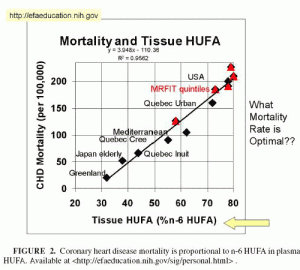As readers of the book know, we regard saturated and monounsaturated fats as the only macronutrients that are safe in unlimited doses. Other macronutrients become toxic above certain levels: glucose above 600 calories per day, protein above about 600 calories, and polyunsaturated fats above 100 calories. We recommend that 60% of calories or more be obtained from saturated and monounsaturated fats.
Since eating more saturated and monounsaturated fats is likely to displace toxic nutrients from the diet, in the general population we would expect higher saturated and monounsaturated fat intake to reduce disease rates.
Despite the prejudice the medical profession has long held against saturated fats, there was never real evidence against them. But after many decades of demonization, high quality studies are now showing saturated fat to be health-improving – just as we would expect.
A New Study from Japan
Via Dr. Briffa and Dr. Stephan Guyenet comes word of a new study from Japan.
This study followed 58,453 Japanese adults, aged 40 to 79 at the start of the study, for 14.1 years. [1] The study found that higher saturated fat intake was associated with:
- A 31% reduction in mortality from stroke
- An 18% reduction in mortality from cardiovascular disease
It was only earlier this year that a systematic review of the literature found that “there is no significant evidence for concluding that dietary saturated fat is associated with an increased risk of CHD or CVD.” [2] In a few decades the reviews will probably have to go further: there will be significant evidence that dietary saturated fat is protective against CHD and CVD.
References
[1] Yamagishi K et al. Dietary intake of saturated fatty acids and mortality from cardiovascular disease in Japanese: the Japan Collaborative Cohort Study for Evaluation of Cancer Risk Study. Am J Clin Nutr. 2010 Aug 4. [Epub ahead of print] http://pmid.us/20685950.
[2] Siri-Tarino PW et al. Meta-analysis of prospective cohort studies evaluating the association of saturated fat with cardiovascular disease. Am J Clin Nutr. 2010 Mar;91(3):535-46. http://pmid.us/20071648.












Recent Comments